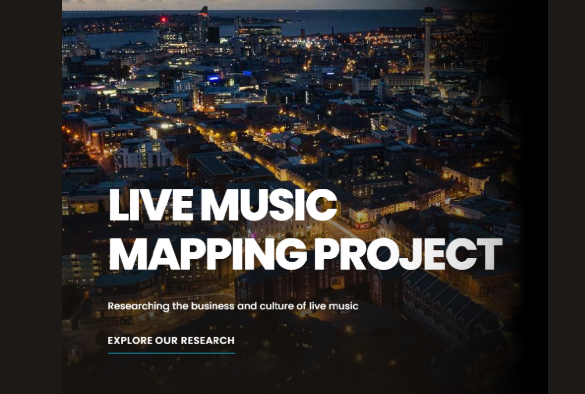Academics from across the University of Liverpool have secured a substantial UKRI Arts and Humanities Research Council (AHRC) Catalyst grant for a new groundbreaking project which will benefit the UK music sector.
Dr Mathew Flynn in the Department of Music, in collaboration with Professor Alex Singleton from the Geographic Data Service and Dr Yang Zhang at the Virtual Engineering Centre (VEC) secured the £299,996 award for The Live Music Mapping Project 2.0: Automating the Mapping, Modelling and Measuring of the Impacts of Regional Live Music Sectors.
The two-year project will develop an automated system for gathering and analysing live music data to provide industry partners and policymakers with reliable, timely insights into the music sector’s regional impact. Using machine learning, the project will automate data collection processes that traditionally relied on labour intensive, manual methods. This will enable real-time mapping and robust data analysis on key social, cultural and economic indicators of the music industry.
Launching in January 2025, the project will test its models in key UK music hubs, with the potential to expand internationally. As the first initiative of its kind to deliver a scalable, automated data collection tool for live music, the project will provide valuable, actionable insights to those driving growth within the live music and broader night-time economy.
Delivered in partnership with the Night Time Industries Association (NTIA), Live Music Industry Venues and Entertainment (LIVE), the Liverpool and West Midlands City Region Music Boards, and Generator in Newcastle, the project aims to better inform the decision-making of musicians, music industry professionals/organisations, local/regional authorities and policy-makers.
The team at the University of Liverpool will collaborate with Dr Adam Behr at Newcastle University (Music) and Dr Patrycja Rozbicka from Aston University (Politics) to deliver the project.
The Live Music Mapping Project 2.0 builds upon existing live music mapping research across Liverpool, Birmingham and Newcastle. Dr Flynn and Professor Singleton conducted a prototype project earlier this year to illustrate how insights from Eurovision in Liverpool can inform decision making about large-scale events in cities.
Dr Mathew Flynn said: “Using machine learning tools to compile and verify datasets, the project aims to introduce an interactive digital platform that displays these insights in intuitive, stakeholder-friendly formats, such as maps and dashboards.
“The platform will allow stakeholders to see live music’s role in local economies by tracking data on factors like attendance, venue location, and socio-economic impact. This data will serve as a vital resource for local authorities, policymakers, and industry leaders looking to enhance music ecosystems sustainably.”
Professor Alex Singleton said: “As the first scalable tool of its kind, this project has the potential to revolutionise how we understand the cultural and economic footprint of live music, providing data-driven insights that can shape the future of urban and regional planning.”
Jon Collins, Chief Executive of LIVE said: “The team at University of Liverpool have long understood the value of the UK’ s music industry – economically, culturally and societally. As policymakers at local, regional and national levels increasingly recognise the potential of our music sector to drive economic growth and social cohesion, it is critical that we have a robust evidence base on which to build policy. That starts with mapping out the array of players in UK music so we can better understand partnerships, gaps and opportunities. LIVE is proud to support this project and we look forward to working with Dr Flynn and colleagues to build on the excellent work to date.”
Michael Kill, CEO of the Night Time Industries Association, commented: “This groundbreaking project represents a significant leap forward for the live music and broader night-time economy. The collaboration between the University of Liverpool and key stakeholders will create invaluable tools to better understand and amplify the impact of live music on local and regional communities.
“With real-time data and actionable insights, this initiative has the potential to revolutionize how we approach policy-making, investment, and growth within the sector. Projects like the Live Music Mapping Project 2.0 are essential to driving innovation and sustainability in our industry, ensuring its resilience and relevance for years to come. We’re proud to support this initiative and look forward to seeing the positive outcomes it will bring.”
